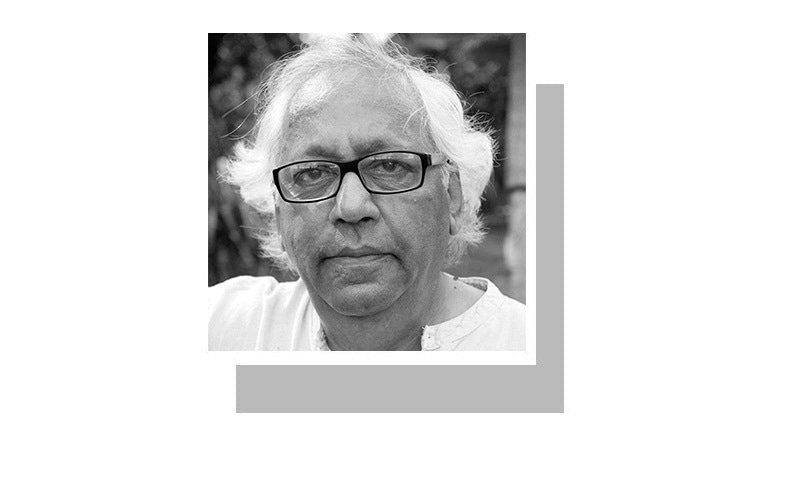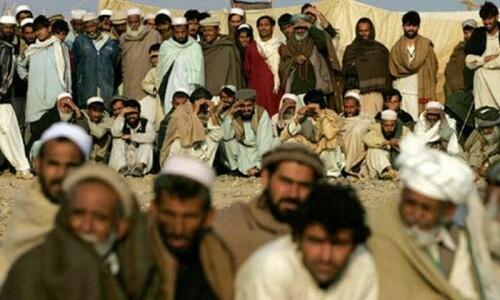
AS the echoes of the recent Senate election linger in the air like a bad smell, the winners smirk while the losers whinge.
Nothing new here: every Senate election I can remember has been tainted by charges of corruption and horse-trading. This can hardly be avoided in a secret, indirect poll where the small pool of voters can command exorbitant sums for their support.
The biggest loser has been the MQM, winning just a single Senate seat out of a projected three, and possibly four. Split into multiple warring factions, its last-minute agreement to unify behind the candidates collapsed with its members voting according to their conscience, or lack of one.
Turf wars broke out over the right to collect ‘bhatta’.
Dr Farooq Sattar, the leader of the MQM-P, is being blamed for the debacle caused by his insistence on nominating Kamran Tessori, a newcomer to the party, as a Senate candidate in the face of strong opposition from the rank and file. For a party that has boasted of its middle-class roots to thus elevate someone perceived as a billionaire was bound to cause a revolt.
The recent defection of several MQM-P provincial assembly members to the PPP is an indication of the depth of frustration and anger over the way their party has imploded. And while Sattar might be the target for much of this ire, the reason for the MQM’s disarray lies far away in London.
Till a couple of years ago, defections from the MQM of the kind we have witnessed were simply unthinkable as the only way members could leave the party was horizontally in gunny bags. Altaf Bhai was unforgiving to defectors, and his sector commanders were known to carry out executions with cold-blooded efficiency.
And yet the MQM leader was hugely popular among the Mohajirs of urban Sindh as he was viewed as the man who had given the community a powerful voice in provincial and national politics. Until he marginalised himself by his intemperate and uncontrolled speeches from his London self-exile, he controlled his party with an iron hand, inspiring both fear and respect.
But when he went one step too far — perhaps under the influence — with a speech condemning Partition and mocking army generals, the Lahore High Court banned future broadcasts of his interminable rants. In Karachi, Ranger-led operations locked up a large number of MQM activists and alleged hit-men. Some were gunned down in ‘encounters’ that have become the norm for our law-enforcement agencies.
Younger readers will be unaware of the terror the MQM spread in Karachi in the late 1980s and 1990s. People would not venture out late at night, and shops closed early. Young MQM thugs, armed with automatic weapons, strutted about, shaking down businesses, large and small, demanding ‘contributions’ for the party. This model was replicated a few years later by other political parties. Turf wars then broke out over the right to collect bhatta from different areas.
But perhaps Altaf Hussain’s biggest achievement was to convert his party’s street power into a political machine that delivered large majorities to its urban-based candidates in every election. With unfailing efficiency, sector commanders would turn out the Mohajir vote, and a video showing ballots being stamped by polling officers without a voter in sight went viral a few years ago.
I once asked an ex-minister from the MQM how he could bear to sit through hours of yet another telephonic harangue by Altaf Hussain in the heat of Karachi’s summer. He simply replied: “Because I had no choice.” This is probably the answer most of the audience would give today, free from the gaze of ruthless sector commanders.
So while many Mohajirs would consider themselves liberated from Altaf Hussain’s tyranny, others feel they have lost the clout they once had. Soon after Musharraf’s coup in 1999 when he decided he would stay on, and needed to cobble together a coalition of political parties, he included the MQM in his cabal. When I asked Tariq Aziz, his powerful civilian adviser, why he had pulled in such a violent and disruptive party, he replied it was because Altaf Hussain had the power to shut down Karachi any time he chose. It was better to have his party in the government rather than outside as troublemakers.
Mercifully, the days of ‘protest shutdowns’ called regularly by the MQM are behind us. Apart from the violence and the shake-downs, these disruptive strikes were among the factors that caused many industries to move out of Karachi. Unemployment rose as a result, and the MQM used its influence to cram its supporters into government jobs created for them.
In the 1990s, we thought we had arrived at a two-party system with the PPP and the PML-N taking turns at ruling until their stints were cut short by the military and the judiciary. The MQM played the role of kingmaker. How quickly things can change.
Published in Dawn, March 10th, 2018













































